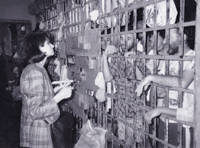|
|
|
When I first met Joanna Weschler (then Joanna Stasinska) in February 1982, she helped me out of a tight spot. I had been deserted by a Solidarity activist who had agreed to accompany me to the Madrid Helsinki Review Conference, where we planned to lobby government delegates and distribute Helsinki Watch reports on human rights violations under martial law in Poland. It was important to have someone from Poland to add firsthand experience to our message.
Joanna herself was in a crisis. A Polish citizen and reporter with the Solidarity Press Agency, she had been visiting Madrid on December 13, 1981, when martial law was declared at home. Having worked with Lech Walesa, she believed that she would be arrested if she attempted to return to her family in Warsaw. Less than two years out of college, her career just beginning, Joanna found herself in exile.
Shortly after she helped me out in Madrid, Joanna came to the United States. She soon found her way to our New York office, in search of work to reconnect her with the issues she cared most about. At the time, we were looking for an associate, someone with excellent clerical skills. Joanna was still struggling with her English and barely able to type. But the other associates took a shine to her and offered to work overtime, correcting her first efforts, so that she could stay. We were never sorry for that decision.
Joanna’s many talents were immediately put to use. She not only took over Human Rights Watch’s research on Poland, but, a Spanish speaker (she had a Masters in Spanish and Latin American Studies from Warsaw University), she helped out with our work on Central America. The Columbia School of Journalism added to her skills, as Joanna told me recently. “I learned to write in English under the gun, to analyze documents and to conduct interviews – all essential skills in human rights work.”
Joanna resisted efforts to involve her exclusively in Eastern Europe. “I did not want to be given a break because of my geographical background,” she explained. “My academic background was in Latin American studies, and I wanted to be judged like any other normal person.” She wanted to prove herself as the American she had become and not be seen as a lifelong refugee. After she convinced Human Rights Watch to begin covering Brazil, she undertook the research herself, mastering Portuguese in the process.
Joanna spearheaded our entrance into a new field: prison conditions for ordinary prisoners: “Today no one questions whether prison conditions belong within the scope of human rights organizations, but then they did,” she recalls. Her reporting on prison conditions in Poland and Brazil led to our Prison Project, of which she was made director in 1990. Under her leadership, the project established models for conducting prison investigations; covered such crises as the aftermath of a 1992 prison massacre in Brazil, in which 111 prisoners were murdered by police and guards; and produced, among many reports, a report on U.S. prisons and another on prison conditions around the world.
Now, as UN representative for Human Rights Watch since 1994, Joanna says that she sometimes misses working directly with people under threat. But she finds the UN work “incredibly interesting.” She is pleased that Secretary-General Kofi Annan has pledged to make human rights an integral part of everything the UN does, be it in the humanitarian, development, political or security spheres. “The beauty of our work,” she says with some organizational pride, “is that it’s based on excellent research. And when you come with such research and a good analysis, you find that people are really interested in what you have to say.”
by Jeri Laber
 |
Joanna Weschler with Lech Walesa and Stanislaw Wadotowski in Warsaw 1981 |
 |
Joanna Weschler, then Director of the HRW Prison Project, interviewing inmates at the now closed DEIC jail in Sao Paulo, notorious for its overcrowding, filth, and acts of brutality |
|
|